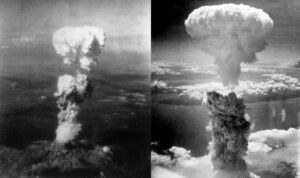
Why in News?
6 August and 9 August mark the anniversaries of the atomic bombings of Hiroshima and Nagasaki in 1945 — a turning point in world history that ended World War II but also began the nuclear age. Every year, these dates are observed to reflect on the humanitarian impact of nuclear weapons and to reaffirm global calls for disarmament.
Background
-
Hiroshima: Bomb dropped on 6 August 1945 (“Little Boy”) by the US.
-
Nagasaki: Bomb dropped on 9 August 1945 (“Fat Man”).
-
Immediate deaths: ~2 lakh people, most of them civilians.
-
The bombings forced Japan’s surrender on 15 August 1945, ending WWII.
Significance in History
-
End of WWII – Accelerated Japan’s unconditional surrender.
-
Start of Nuclear Era – Led to an arms race during the Cold War.
-
Humanitarian Impact – Long-term health effects included cancers, birth defects, and radiation sickness.
-
Moral & Ethical Debate – Questions over necessity vs. excessive destruction.
Impact on International Relations
-
Triggered nuclear arms proliferation.
-
Led to global movements for nuclear disarmament.
-
Inspired treaties like NPT (1968) and CTBT (1996).
Relevance to UPSC GS-1 Syllabus
-
World History: Impact of World War II.
-
Post-War World Order: Rise of US and USSR as superpowers.
-
Ethics & International Relations (linked to GS-4): Moral questions on use of weapons of mass destruction.
India’s Stand
-
Advocates complete nuclear disarmament.
-
Member of various disarmament forums but not a signatory to NPT (due to discriminatory provisions).
Way Forward (Exam Viewpoint)
-
Strengthen multilateral frameworks for nuclear non-proliferation.
-
Promote peaceful uses of nuclear energy under IAEA safeguards.
-
Enhance awareness on humanitarian consequences of nuclear war.




